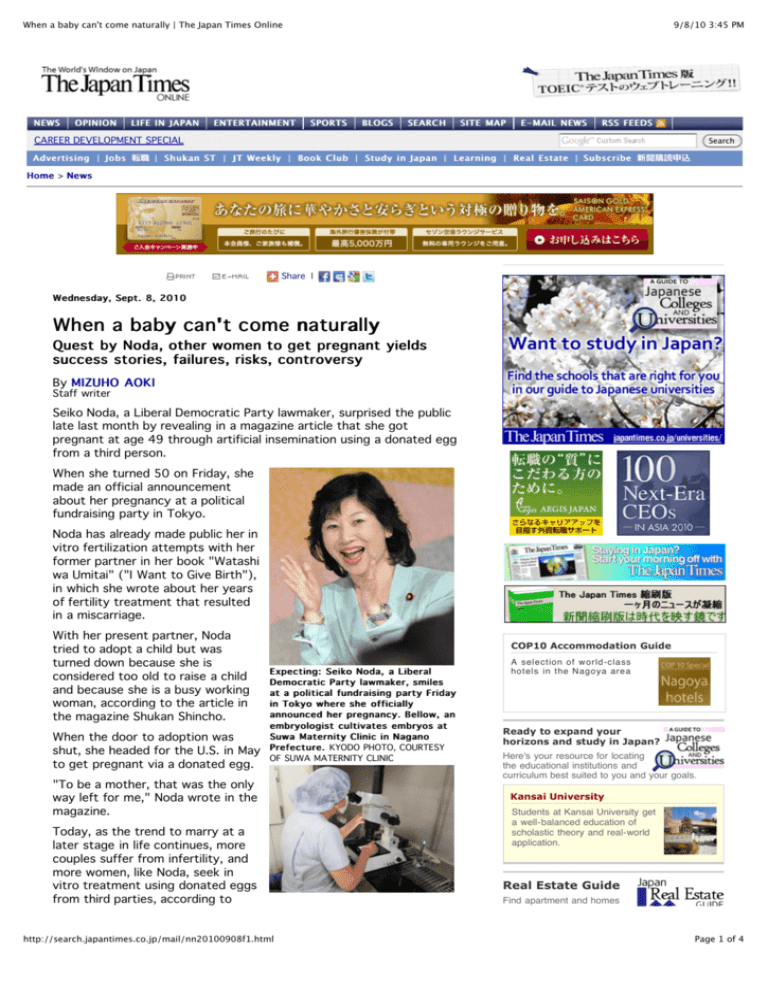
When a baby can't come naturally | The Japan Times Online
NEWS
OPINION
LIFE IN JAPAN
ENTERTAINMENT
9/8/10 3:45 PM
SPORTS
BLOGS
SEARCH
SITE MAP
E -MAIL NEWS
RSS FEEDS
CAREER DEVELOPMENT SPECIAL
Search
Advertising | Jobs 転職 | Shukan ST | JT Weekly | Book Club | Study in Japan | Learning | Real Estate | Subscribe 新聞購読申込
Home > News
Share |
Wednesday, Sept. 8, 2010
When a baby can't come naturally
Quest by Noda, other women to get pregnant yields
success stories, failures, risks, controversy
By MIZUHO AOKI
Staff writer
Seiko Noda, a Liberal Democratic Party lawmaker, surprised the public
late last month by revealing in a magazine article that she got
pregnant at age 49 through artificial insemination using a donated egg
from a third person.
When she turned 50 on Friday, she
made an official announcement
about her pregnancy at a political
fundraising party in Tokyo.
Noda has already made public her in
vitro fertilization attempts with her
former partner in her book "Watashi
wa Umitai" ("I Want to Give Birth"),
in which she wrote about her years
of fertility treatment that resulted
in a miscarriage.
With her present partner, Noda
tried to adopt a child but was
turned down because she is
considered too old to raise a child
and because she is a busy working
woman, according to the article in
the magazine Shukan Shincho.
When the door to adoption was
shut, she headed for the U.S. in May
to get pregnant via a donated egg.
COP10 Accommodation Guide
Expecting: Seiko Noda, a Liberal
Democratic Party lawmaker, smiles
at a political fundraising party Friday
in Tokyo where she officially
announced her pregnancy. Bellow, an
embryologist cultivates embryos at
Suwa Maternity Clinic in Nagano
Prefecture. KYODO PHOTO, COURTESY
OF SUWA MATERNITY CLINIC
"To be a mother, that was the only
way left for me," Noda wrote in the
magazine.
Today, as the trend to marry at a
later stage in life continues, more
couples suffer from infertility, and
more women, like Noda, seek in
vitro treatment using donated eggs
from third parties, according to
http://search.japantimes.co.jp/mail/nn20100908f1.html
A selection of world -class
hotels in the Nagoya area
Ready to expand your
horizons and study in Japan?
Here's your resource for locating
the educational institutions and
curriculum best suited to you and your goals.
Kansai University
Students at Kansai University get
a well-balanced education of
scholastic theory and real-world
application.
Real Estate Guide
Find apartment and homes
that best suit your lifestyle,
Page 1 of 4
When a baby can't come naturally | The Japan Times Online
9/8/10 3:45 PM
experts.
While the use of such advanced
fertility technologies remains highly
controversial in Japan for ethical
and legal reasons, medical experts
say the government urgently needs
to establish clear guidelines or a law
on in vitro fertilization using
donated ova, because such cases
are expected to increase.
that best suit your lifestyle,
income and time frame in Japan.
Microfinance
Empowers
Join us in enabling the
poorest of the poor to
improve their own lives
www.GrameenFoundation.org
Fertility declines after the age of
Public Service Ads by Google
around 35, and the chance of
getting pregnant becomes extremely slim after around 42 because as
women age both the quantity and quality of their eggs decline,
experts say.
"When the reason for infertility is due to women's age, it is difficult to
be treated. For some, the only way to have a baby is to use donated
ova (of young women)," explained Toshio Hara, head of Hara Medical
Clinic in Shibuya Ward, Tokyo. The facility specializes in fertility
treatment.
Although it is not illegal to use donated eggs from third parties in
fertility treatment, the Japan Society of Obstetrics and Gynecology
effectively bans this option among its members. But the absence of a
law regulating the use of donated ova has placed it in a gray zone.
"There may be some clinics that carry out in vitro fertilization using
donated ova behind closed curtains. But because of the lack of clear
guidelines, we do not know who is actually conducting the treatment
in Japan. This is our biggest concern," said Yahiro Netsu, director of
Suwa Maternity Clinic in Nagano Prefecture.
Suwa Maternity Clinic is the first and one of very few clinics in Japan
openly conducting in vitro fertilization using donated eggs. It also
practices a highly controversial surrogate mother program.
Since 1996, under its own guidelines, the clinic has conducted 150
treatments using donated eggs, through which 66 children were born
and seven women are currently pregnant, according to Netsu.
"If an accident happens under such situations, a doctor may not take
responsibility and a patient can fall victim. To avoid this, medicine
must be practiced openly, especially when it deals with the birth of a
human life," Netsu said.
In 2003, an advisory panel at the Health, Labor and Welfare Ministry
released a report that recommended allowing the use of assisted
reproductive technology using donated eggs from anonymous third
parties under certain conditions.
The Japan Times
japantimes
Fukatsu best actress at Montreal; first Japanese
female to take festival's top prize since 1983
http://ow.ly/2ATca #movies
3 hours ago
Q&A; For most, adoption option impractical,
iffy http://ow.ly/2ASNG
3 hours ago
Surging yen having a negative impact on sales
at 37% of nation's companies
http://ow.ly/2ASME
3 hours ago
When a baby can't come naturally; Quest by
Noda, other women to get pregnant yields
success, failures, risks, controversy
http://ow.ly/2ATeR
3 hours ago
Join the conversation
Poll
Most read stories
Editors' picks
A piece of your mind
Dining on a theme
In Japan, a lot restaurateurs have been
putting something extra on menu:
entertainment. Which of these theme
restaurants would you like to try?
Ninja Akasaka — dining on shuriken
snacks
Sengoku Buyuden — dining in ye
olde Warring States period
Ehon no Kuni no Alice — dining down
the rabbit hole
Yurei Izakaya — dining among the
dearly departed
The Lock Up dining behind bars
Vampire Cafe — dining with the
Count
No entertainment with my meal,
thank you.
Total Votes : 1444
View past polls
However, no law followed this up because there were many opinions
on the issue and no consensus, according to Yoko Izumi, a director in
the health ministry's maternal and child health division.
As for the mother and child relationship, under the current law, the
woman who gives birth is registered as the child's mother. That
means, in Noda's case, she will be the mother of the child she is
carrying.
Osamu Ishihara, professor and chairman in the department of
obstetrics and gynecology at Saitama Medical University, said Japan is
among the few developed countries where donated eggs are almost
unused.
"Donated ova were used for about 3 percent of the babies who were
born with assisted reproductive technology in the world. In the case of
America, the ratio is about 12 percent," Ishihara said.
http://search.japantimes.co.jp/mail/nn20100908f1.html
Page 2 of 4
When a baby can't come naturally | The Japan Times Online
9/8/10 3:45 PM
According to Ishihara, Italy and Turkey are the only countries in
Europe that as of 2009 continued to ban the use of both donated
sperm and eggs from third parties.
Although the government has not made significant progress, many
children have been born via assisted reproductive technologies, or
ART.
Nearly 20,000 babies, or 1 in about 56, were born through ART in
2006, according to the Japan Society of Obstetrics and Gynecology.
While no records exist on the number of Japanese women who had
fertility treatments using donated ova, more people are seeking the
treatment overseas, experts say.
Yukari Kawada, head of IntroMed, Inc. IFC, a fertility treatment
coordinating agency in San Francisco, said the number of Japanese
patients who enter its donated egg program is on the rise.
Since Kawada founded the agency 16 years ago, it has arranged for
more than 700 Japanese couples to have assisted reproductive
technology using donated ova from third parties in the U.S.
"Nearly 130 couples are currently under our donated ova programs,"
Kawada said in an e-mail.
One treatment costs about $55,000 on average, excluding travel
fees, Kawada said.
More than 60 percent of the agency's patients are in their 40s and
the agency boasts a 75 percent pregnancy rate. The agency accepts
patients up to age 53.
Hara of Hara Medical Clinic warned of the risks of pregnancy at an
older age.
"As long as a woman's uterus is in good condition, she can become
pregnant by using donated eggs, regardless of her age. But by
carrying a baby, her body needs to function for two people, and that
puts the body in danger," he said.
According to Hara, pregnancy at over age 45 comes with many risks,
including higher rates of miscarriage, pregnancy-induced hypertension
and premature birth.
"It is up to medical doctors to judge the use of donated eggs. But
everything is too vague and we are scared of crossing the lines," Hara
said. "(The government has to provide) legislated guidelines to keep
medical practice safe."
Women who go through fertility treatments meanwhile say they
experience enormous mental and physical burdens. Orie Amada, 38,
who got pregnant in her third in vitro fertilization attempt at age 34,
said if she was still struggling with getting pregnant and if the use of
donated eggs from third parties was available in Japan, she might
have thought of undergoing the new option.
"I was desperate to have my own child no matter what happened to
my body," Amada said. "Looking back now, I think my mental state
wasn't normal during that time."
Misako Takahashi, 41, who tried in vitro fertilization about a decade
ago but didn't get pregnant, voiced her concern over the spreading
use of fertility treatments.
"I wasn't craving a child that much before the treatment. But as I
went through the physical pain and sense of loss after failed
attempts, I was obsessed with making a baby," Takahashi recalled.
After realizing it's not healthy for both her body and mind, she
dropped the treatment.
"I think, for some, the use of donated eggs is good news. But people
http://search.japantimes.co.jp/mail/nn20100908f1.html
Page 3 of 4
When a baby can't come naturally | The Japan Times Online
9/8/10 3:45 PM
should know that not all can have a child by receiving fertility
treatments. No matter how advanced medical treatment gets, there
will be people who cannot give birth," Takahashi said. "Women should
be aware of that."
Related link
Q&A
For most, adoption option impractical, iffy
By NATSUKO FUKUE
Share |
We welcome your opinions. Click to send a message to the
editor.
The Japan Times
(C) All rights reserved
About us | Work for us | Contact us | Privacy policy | Link policy | Registration FAQ
Advertise in japantimes.co.jp.
This site has been optimized for modern browsers. Please make sure that Javascript is enabled in your browser's preferences.
The Japan Times Ltd. All rights reserved.
http://search.japantimes.co.jp/mail/nn20100908f1.html
Page 4 of 4






